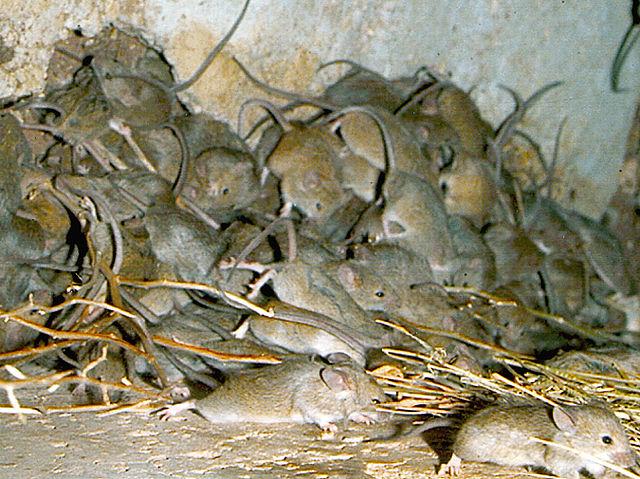
Planet A
A sustained mouse plague has consumed grain and hay stocks and damaged machinery on thousands of Australian farms this year, reducing the country’s overall crop value by an estimated $1 billion. While rodent populations usually contract rapidly following a major infestation, the CSIRO says there’s no sign of that happening yet, with dire potential consequences for Australia’s agricultural sector and food security.
Events like droughts and bushfires, which can reduce predator numbers, followed by rains tend to support higher rodent populations. The rising likelihood of compound intense weather events under climate-change conditions may make mouse plagues more frequent and more severe. Milder winters also support rodent booms, as is already being seen across the US.
Conventional pest-control methods, such as poisoning, poses its own risks. New rodenticides, including genetic biocontrol, are undergoing approval, but experts warn that they may also kill rodents’ natural predators and even endanger humans through the food chain.
Democracy watch
Nicaraguan President Daniel Ortega has jailed 13 opposition leaders, including four potential presidential candidates, for ‘national security’ reasons ahead of elections in November. There appears to be a lack of substance behind the allegations, leading commentators to view them as targeted crackdowns on political opposition.
Nicaragua’s government-linked electoral board has also ruled that political candidates charged with dissent should be disqualified from running for office. Observers have labelled the state of affairs a ‘democracy crisis’, and Nicaraguan analyst Eliseo Nunez says the president ‘is on the verge of ending all political competition’ and establishing a ‘dictatorship’.
More than 108,000 Nicaraguans have left the country since Ortega’s government violently suppressed nationwide anti-government protests in 2018. At the time at least 325 people were killed and hundreds were detained.
The Biden administration has pledged to prioritise stability in Central America and is now threatening to sanction Nicaragua, whose economy depends on preferential US exports and loans. It’s feared, however, that severe economic contraction will cause further mass migration and instability.
Information operations
Network analysis company Graphika has released a report exposing a covert Russian information operation targeting American far-right groups on fringe online platforms. The campaign began two days after last year’s presidential election and involves actors linked to a previous campaign attributed to the Russian troll farm the ‘Internet Research Agency’ financed by Russian businessman Yevgeny Prigozhin.
The campaign has been spreading divisive and inflammatory narratives, including allegations of voter fraud, racist attacks on US Vice President Kamala Harris and paedophilia accusations against President Joe Biden. Graphika found the campaign was most active on the far-right discussion forum patriots.win, where 20 inauthentic accounts spread the narratives that were then reposted by accounts on Gab and Parler.
But the campaign’s content failed to gain traction in the wider right-wing community. The report’s findings demonstrate that, while Russian actors can create a direct line to online far-right communities through these platforms, a greater threat is posed by homegrown extremist actors.
Follow the money
As China is rapidly developing its economy and technology, climate change looks set to become one of the major threats to the country’s economic progress. President Xi Jinping has pledged that China will become carbon neutral by 2060. But rising sea levels pose threats to the critical special economic zones along its east coast. Cities such as Guangzhou and Dongguan have been recognised as some of the world’s most vulnerable areas to sea-level rises.
The Financial Times reports that trillions of dollars of China’s economic activity could come under threat, particularly in Shanghai, which was home to more than US$900 billion of economic activity in 2019. Many of China’s most important R&D and manufacturing hubs are condensed along its seaboard.
Although Xi has declared his net-zero ambitions, China has yet to provide a clear roadmap to address the threat of sea-level rise and climate change more broadly or to explain how the 2060 goal will be achieved.
Terror byte
French President Emmanuel Macron announced his intention to end Operation Barkhane and withdraw the 5,100 French troops working alongside Burkina Faso, Chad, Mali, Mauritania and Niger to combat ongoing Islamic insurgents in West Sahel. The French-led offensive was launched in 2013, but Macron indicated that France’s presence could not continue forever, despite his description of the region as ‘the epicenter of international terrorism’. The Sahel’s ongoing instability has been due to a combination of terrorist attacks, climate change and ethnic conflicts.
Rising troop deaths, jihadists’ continued foothold in the region and growing discontent over France’s military presence from politicians and residents in the Sahel has led to dwindling support for the operation in both France and G5 countries. Discussions to replace it with a broader international effort will be held in the next few weeks. The continuing insecurity in the Sahel calls into question the efficacy of multilateral military deployments in quelling terrorism in the region.